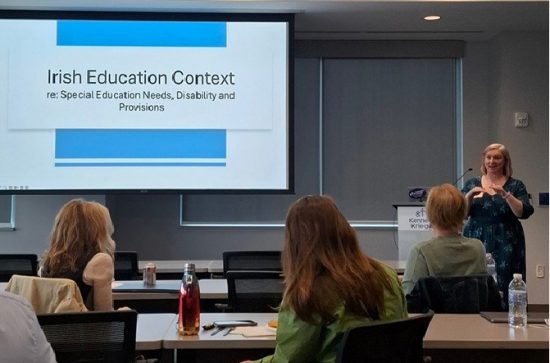
In March 2025, Dr. Margaret Flood from Maynooth University’s Department of Education travelled to Baltimore alongside Research Assistant Tara Ciric, and colleagues from Childhood Cancer Ireland and Children’s Health Ireland (Crumlin Hospital), for a week of shared learning and collaboration with professionals at the Kennedy Krieger Institute and Johns Hopkins.
The visit focused on advancing understanding and practices related to childhood cancer survivorship but also extended to exploring the educational impact of other chronic health conditions such as sickle cell disease on our young learners. Hosted by Dr. Lisa Carey and colleagues, the Irish delegation participated in clinical observations, interdisciplinary workshops, and strategic planning sessions covering topics including neuro-oncology rounds, survivorship clinics, education transition supports, and brain injury rehabilitation.
Key highlights included engagement with the Hospital Education Liaison Program (H.E.L.P.) team, discussions around transdisciplinary research and patient advocacy, and learning from programmes such as the Specialized Transition Program and the Sickle Cell Neurodevelopmental Clinic. These sessions deepened participants’ understanding of how chronic illness affects educational access and outcomes, and how collaborative, patient/learner-centred models can support children and young people, and their families, in navigating these challenges.
Dr. Margaret Flood reflected on the experience, saying:
“This visit offered invaluable insight into how clinical and educational teams in Maryland, U.S. work together to support children and young people living with and beyond cancer and other chronic conditions. It reinforced the importance of ensuring that illness does not become a barrier to learning, and that education systems play a vital role in supporting children’s long-term development and wellbeing. It was a powerful reminder of the importance of interdisciplinary collaboration and patient/learner-centred care.”
The visit was made possible through the generous support of Childhood Cancer Ireland, whose commitment to advocacy and collaboration continues to drive improvements in care and outcomes for children treated for cancer and families across Ireland.
